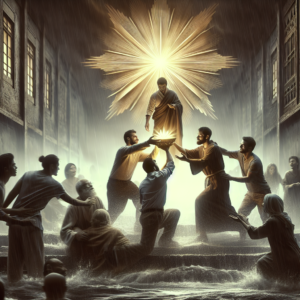Spiritual Devotional about Mysticism and Esoteric Knowledge
Title: Embracing the Mystical Journey: Unveiling Esoteric Wisdom Through Faith
Hello beautiful souls!
Today, let’s embark on a fascinating journey into the realms of mysticism and esoteric knowledge. These are realms often shrouded in mystery and intrigue, yet they hold profound insights and wisdom that can illuminate our spiritual paths. By aligning these mystical insights with biblical principles, we can foster a deeper understanding of both the seen and unseen dimensions of our spiritual journey.
Mysticism: The Quest for Divine Union
At its core, mysticism is the journey towards a deeper, more intimate connection with the Divine. Mystics throughout history have sought to go beyond the surface, yearning for a direct experience with God. This longing is beautifully echoed in Psalm 42:1, "As the deer pants for streams of water, so my soul pants for you, my God." This imagery captures the essence of the mystical pursuit—a profound thirst for God’s presence and an immersive experience of His love and wisdom.
As you cultivate this divine relationship, remember that God invites us all to be seekers of His truth and vessels of His divine love. We are gently reminded of this in Jeremiah 29:13, "You will seek me and find me when you seek me with all your heart." Just as the mystics before us, we are encouraged to delve deeply, to knock persistently on the doors of heaven, and to allow our hearts to be transformed.
Esoteric Knowledge: Unveiling Hidden Wisdom
Esoteric knowledge often refers to the hidden or inner teachings that lie beneath the surface of spiritual traditions. In the Bible, we find an exploration of such deeper understandings. Proverbs 25:2 tells us, "It is the glory of God to conceal a matter; to search out a matter is the glory of kings." This verse invites us towards a noble endeavor—seeking wisdom that is not immediately visible, but beautifully layered and rich in significance.
Through the lens of esoteric wisdom, we can appreciate the Bible’s multi-dimensional teachings, full of metaphor, allegory, and profound spiritual truths. Meditating on scripture, dwelling in its stories, and allowing the Holy Spirit to reveal new insights to us can lead to profound revelations.
Embrace the Spiritual Journey
As we embrace mysticism and explore esoteric knowledge, let’s hold fast to the underlying principle that God is ever-present and reaching out to us. His invitation is simple yet powerful: to journey deeper into His presence and to witness the unfolding of His mysteries in our lives.
May we be inspired by the mystics’ enthusiasm and dedication, aware that each step taken in faith will lead us into greater understanding and love. We hold within us the capacity to be both students and teachers, sharing our discoveries with those who walk alongside us.
As you step into your mystical journey, I encourage you to remain open-hearted and curious. Celebrate the sacred dance of seeking and finding, knowing that with every step, you are drawing closer to the Divine. Let your journey be infused with joy, for you are exploring the infinite beauty and wisdom of God!
Blessings,
[Your Name]
Explore and dig up answers yourself with our BGodInspired Bible Tools! Be careful – each interaction is like a new treasure hunt… you can get lost for hours 🙂
Q&A about Mysticism and Esoteric Knowledge
Certainly! Here’s a fictional Q&A that delves into the fascinating realms of mysticism and esoteric knowledge:
Q1: What is mysticism?
A1: Mysticism is a spiritual belief system and practice that seeks to achieve a direct, personal union with the divine or ultimate reality. It often emphasizes the experience of transcending normal human perception to gain a deeper insight into spiritual truths and the nature of existence. This can be achieved through meditation, contemplative practices, and other spiritual disciplines.
Q2: How is esoteric knowledge different from exoteric knowledge?
A2: Esoteric knowledge refers to the hidden or inner teachings that are often only accessible to a select group of individuals who have been initiated into certain spiritual or philosophical traditions. It deals with deeper, metaphysical truths that are not widely disseminated. In contrast, exoteric knowledge is open and available to the general public, consisting of teachings and practices that are outwardly observable and shared.
Q3: Can you give an example of an esoteric tradition?
A3: The Kabbalah, a mystical and esoteric interpretation of Jewish teachings, is a prominent example. It explores the nature of the divine, the universe, and the human soul through a complex system of symbolism and numerology. The Tree of Life, a central symbol in Kabbalah, represents various metaphysical concepts and pathways leading to spiritual enlightenment and understanding the divine.
Q4: What role do symbols play in esoteric teachings?
A4: Symbols are fundamental in esoteric teachings as they convey complex metaphysical ideas and spiritual truths that are beyond the scope of ordinary language. They serve as tools for meditation and introspection, guiding practitioners toward deeper understanding and insight. For example, the mandalas in Eastern traditions symbolize the universe and are used as focal points for meditation and spiritual growth.
Q5: Are there any common practices associated with mysticism?
A5: Yes, there are several practices commonly associated with mysticism, including meditation, prayer, ritual, contemplation, and the study of sacred texts. These practices are designed to quiet the mind, open the heart, and facilitate a direct experience or communion with the divine. Additionally, many mystics emphasize the importance of leading an ethical life as a foundation for spiritual practice.
Q6: How does one begin exploring esoteric knowledge?
A6: Exploring esoteric knowledge often begins with studying key texts, spiritual traditions, and teachings associated with mysticism. This can include reading works by renowned mystics, attending workshops or lectures, and joining study groups or societies dedicated to esoteric and mystical study. It is also important to engage in regular spiritual practice, such as meditation or prayer, to cultivate inner awareness and receptivity to deeper truths.
Q7: Is mysticism compatible with modern science?
A7: While mysticism and modern science operate in different domains, they can be seen as complementary rather than contradictory. Mysticism addresses questions of purpose, meaning, and inner experience that science may not fully explore, while science provides empirical insights into the physical world. Some contemporary thinkers and scientists explore the integration of scientific and mystical perspectives, seeking a holistic understanding of reality.
I hope this Q&A provides a useful overview of mysticism and esoteric knowledge! If you have any more questions or need further information, feel free to ask.


